Organizational Behaviour Report: Analysis of Unilever's Practices
VerifiedAdded on 2023/01/11
|15
|4879
|47
Report
AI Summary
This report provides an analysis of organizational behaviour within Unilever, a multinational corporation. It examines how culture, power, and politics influence individual and team behaviour and performance, evaluating these factors' positive and negative impacts. The report further assesses content and process theories of motivation, exploring how motivational techniques contribute to achieving organizational goals. It includes an explanation of effective and ineffective team dynamics and applies organizational behaviour concepts within the context of Unilever, offering recommendations based on the relationship between culture, power, motivation, and organizational success. The report explores the influence of power structures, including legitimate, coercive, reward, information, expert, and referent power, on employee behaviour. Additionally, it covers both positive and negative motivational strategies employed by Unilever, focusing on their impact on employee engagement and productivity. The report concludes with an overview of the factors that impact employee engagement, productivity and the overall impact of Unilever's strategies on its workforce.
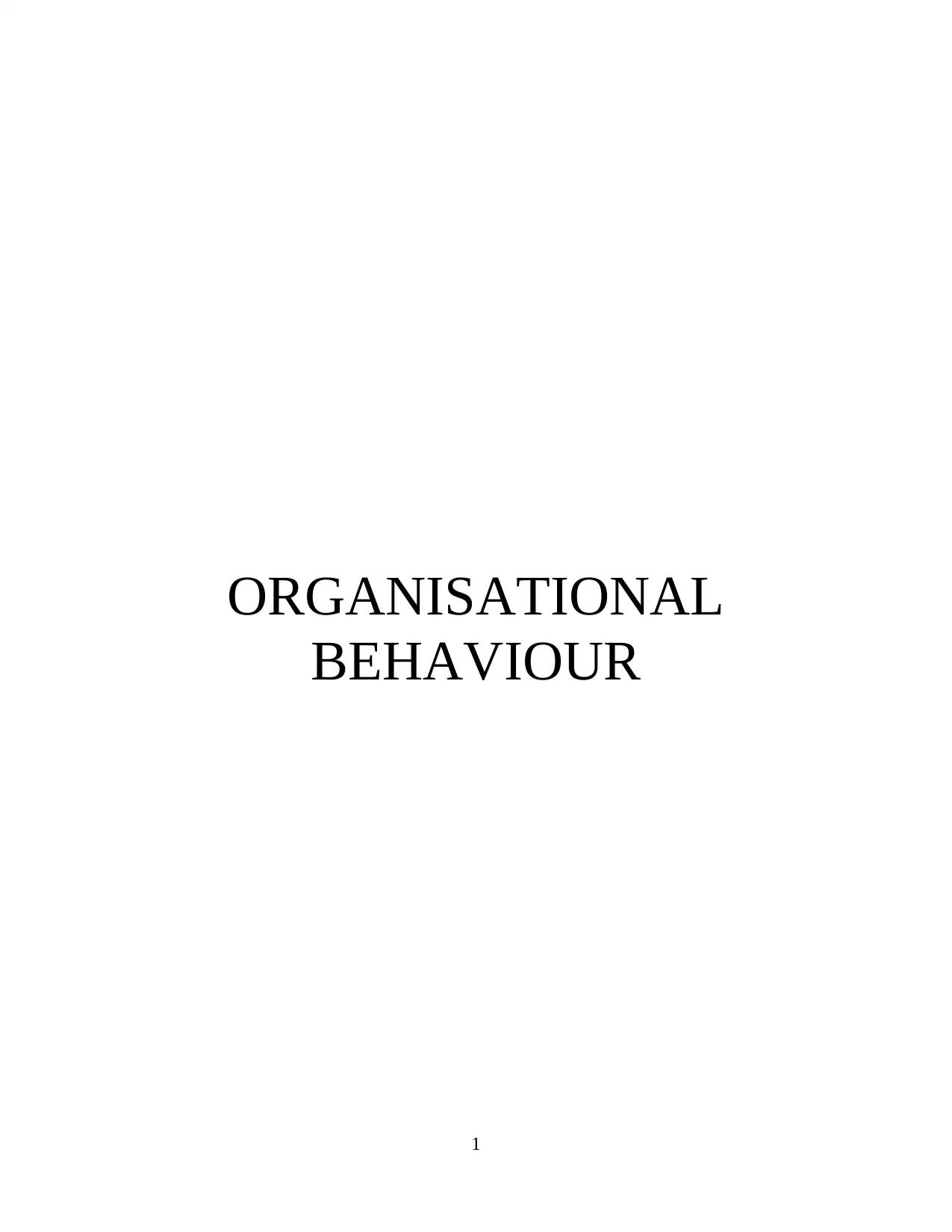
ORGANISATIONAL
BEHAVIOUR
1
BEHAVIOUR
1
Paraphrase This Document
Need a fresh take? Get an instant paraphrase of this document with our AI Paraphraser
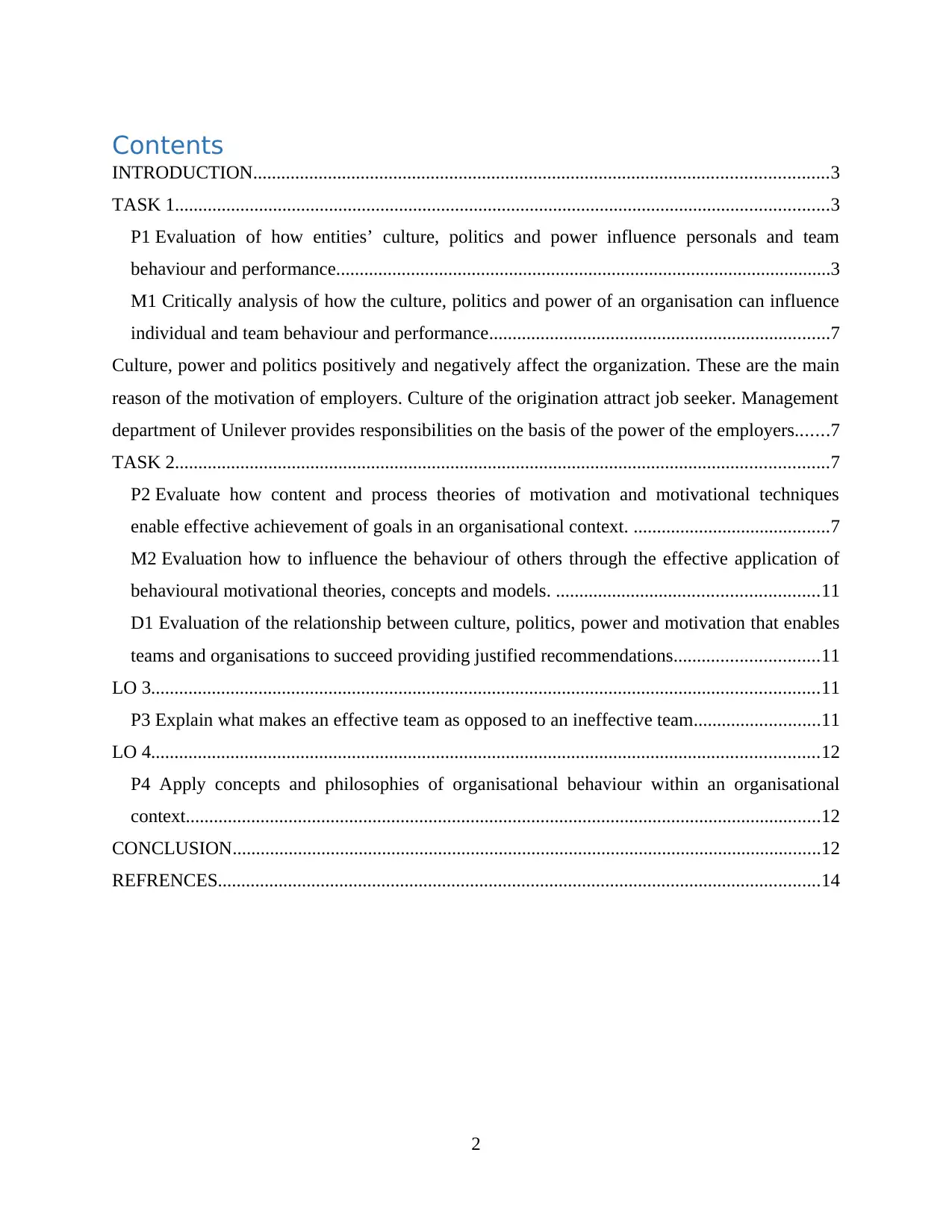
Contents
INTRODUCTION...........................................................................................................................3
TASK 1............................................................................................................................................3
P1 Evaluation of how entities’ culture, politics and power influence personals and team
behaviour and performance..........................................................................................................3
M1 Critically analysis of how the culture, politics and power of an organisation can influence
individual and team behaviour and performance.........................................................................7
Culture, power and politics positively and negatively affect the organization. These are the main
reason of the motivation of employers. Culture of the origination attract job seeker. Management
department of Unilever provides responsibilities on the basis of the power of the employers.......7
TASK 2............................................................................................................................................7
P2 Evaluate how content and process theories of motivation and motivational techniques
enable effective achievement of goals in an organisational context. ..........................................7
M2 Evaluation how to influence the behaviour of others through the effective application of
behavioural motivational theories, concepts and models. ........................................................11
D1 Evaluation of the relationship between culture, politics, power and motivation that enables
teams and organisations to succeed providing justified recommendations...............................11
LO 3...............................................................................................................................................11
P3 Explain what makes an effective team as opposed to an ineffective team...........................11
LO 4...............................................................................................................................................12
P4 Apply concepts and philosophies of organisational behaviour within an organisational
context........................................................................................................................................12
CONCLUSION..............................................................................................................................12
REFRENCES.................................................................................................................................14
2
INTRODUCTION...........................................................................................................................3
TASK 1............................................................................................................................................3
P1 Evaluation of how entities’ culture, politics and power influence personals and team
behaviour and performance..........................................................................................................3
M1 Critically analysis of how the culture, politics and power of an organisation can influence
individual and team behaviour and performance.........................................................................7
Culture, power and politics positively and negatively affect the organization. These are the main
reason of the motivation of employers. Culture of the origination attract job seeker. Management
department of Unilever provides responsibilities on the basis of the power of the employers.......7
TASK 2............................................................................................................................................7
P2 Evaluate how content and process theories of motivation and motivational techniques
enable effective achievement of goals in an organisational context. ..........................................7
M2 Evaluation how to influence the behaviour of others through the effective application of
behavioural motivational theories, concepts and models. ........................................................11
D1 Evaluation of the relationship between culture, politics, power and motivation that enables
teams and organisations to succeed providing justified recommendations...............................11
LO 3...............................................................................................................................................11
P3 Explain what makes an effective team as opposed to an ineffective team...........................11
LO 4...............................................................................................................................................12
P4 Apply concepts and philosophies of organisational behaviour within an organisational
context........................................................................................................................................12
CONCLUSION..............................................................................................................................12
REFRENCES.................................................................................................................................14
2
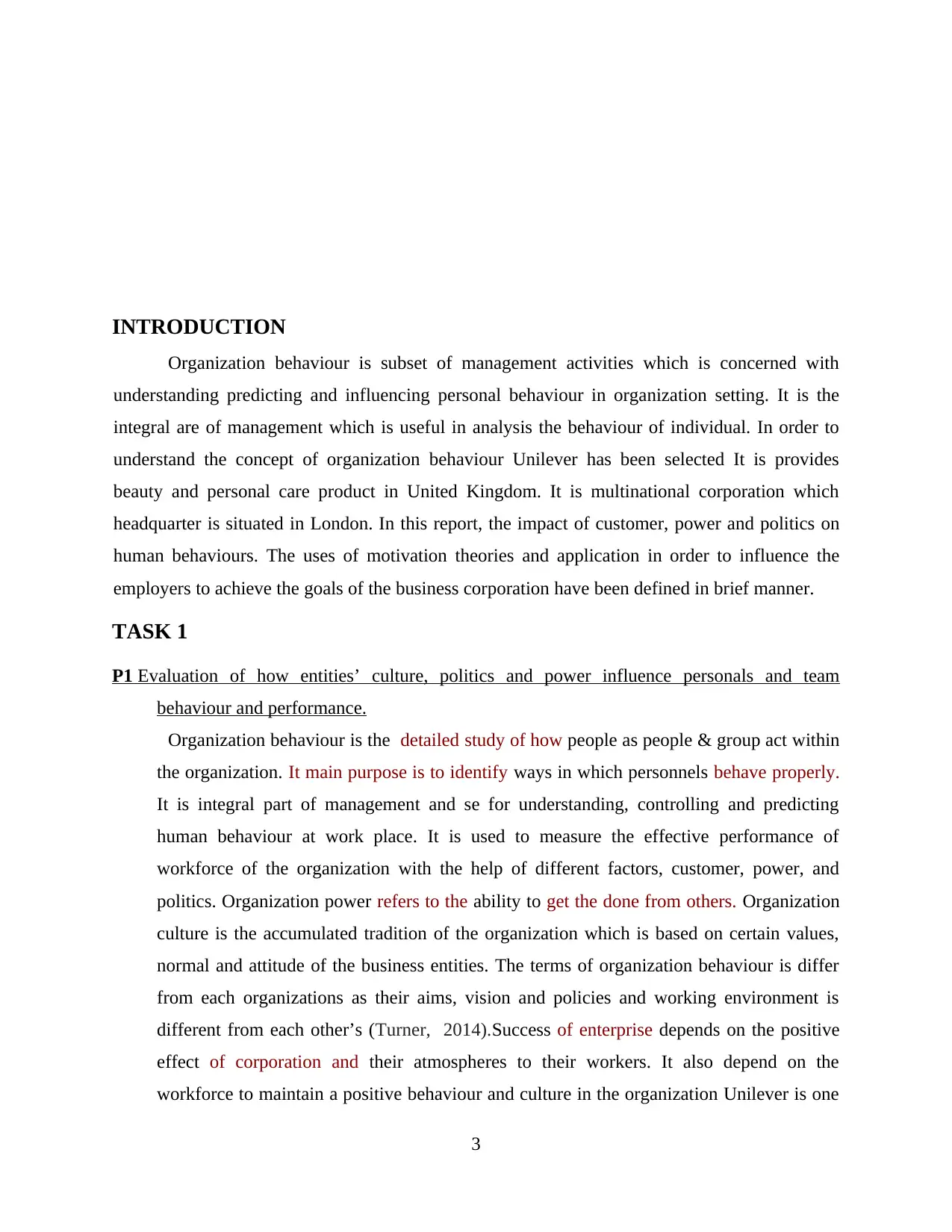
INTRODUCTION
Organization behaviour is subset of management activities which is concerned with
understanding predicting and influencing personal behaviour in organization setting. It is the
integral are of management which is useful in analysis the behaviour of individual. In order to
understand the concept of organization behaviour Unilever has been selected It is provides
beauty and personal care product in United Kingdom. It is multinational corporation which
headquarter is situated in London. In this report, the impact of customer, power and politics on
human behaviours. The uses of motivation theories and application in order to influence the
employers to achieve the goals of the business corporation have been defined in brief manner.
TASK 1
P1 Evaluation of how entities’ culture, politics and power influence personals and team
behaviour and performance.
Organization behaviour is the detailed study of how people as people & group act within
the organization. It main purpose is to identify ways in which personnels behave properly.
It is integral part of management and se for understanding, controlling and predicting
human behaviour at work place. It is used to measure the effective performance of
workforce of the organization with the help of different factors, customer, power, and
politics. Organization power refers to the ability to get the done from others. Organization
culture is the accumulated tradition of the organization which is based on certain values,
normal and attitude of the business entities. The terms of organization behaviour is differ
from each organizations as their aims, vision and policies and working environment is
different from each other’s (Turner, 2014).Success of enterprise depends on the positive
effect of corporation and their atmospheres to their workers. It also depend on the
workforce to maintain a positive behaviour and culture in the organization Unilever is one
3
Organization behaviour is subset of management activities which is concerned with
understanding predicting and influencing personal behaviour in organization setting. It is the
integral are of management which is useful in analysis the behaviour of individual. In order to
understand the concept of organization behaviour Unilever has been selected It is provides
beauty and personal care product in United Kingdom. It is multinational corporation which
headquarter is situated in London. In this report, the impact of customer, power and politics on
human behaviours. The uses of motivation theories and application in order to influence the
employers to achieve the goals of the business corporation have been defined in brief manner.
TASK 1
P1 Evaluation of how entities’ culture, politics and power influence personals and team
behaviour and performance.
Organization behaviour is the detailed study of how people as people & group act within
the organization. It main purpose is to identify ways in which personnels behave properly.
It is integral part of management and se for understanding, controlling and predicting
human behaviour at work place. It is used to measure the effective performance of
workforce of the organization with the help of different factors, customer, power, and
politics. Organization power refers to the ability to get the done from others. Organization
culture is the accumulated tradition of the organization which is based on certain values,
normal and attitude of the business entities. The terms of organization behaviour is differ
from each organizations as their aims, vision and policies and working environment is
different from each other’s (Turner, 2014).Success of enterprise depends on the positive
effect of corporation and their atmospheres to their workers. It also depend on the
workforce to maintain a positive behaviour and culture in the organization Unilever is one
3
⊘ This is a preview!⊘
Do you want full access?
Subscribe today to unlock all pages.

Trusted by 1+ million students worldwide
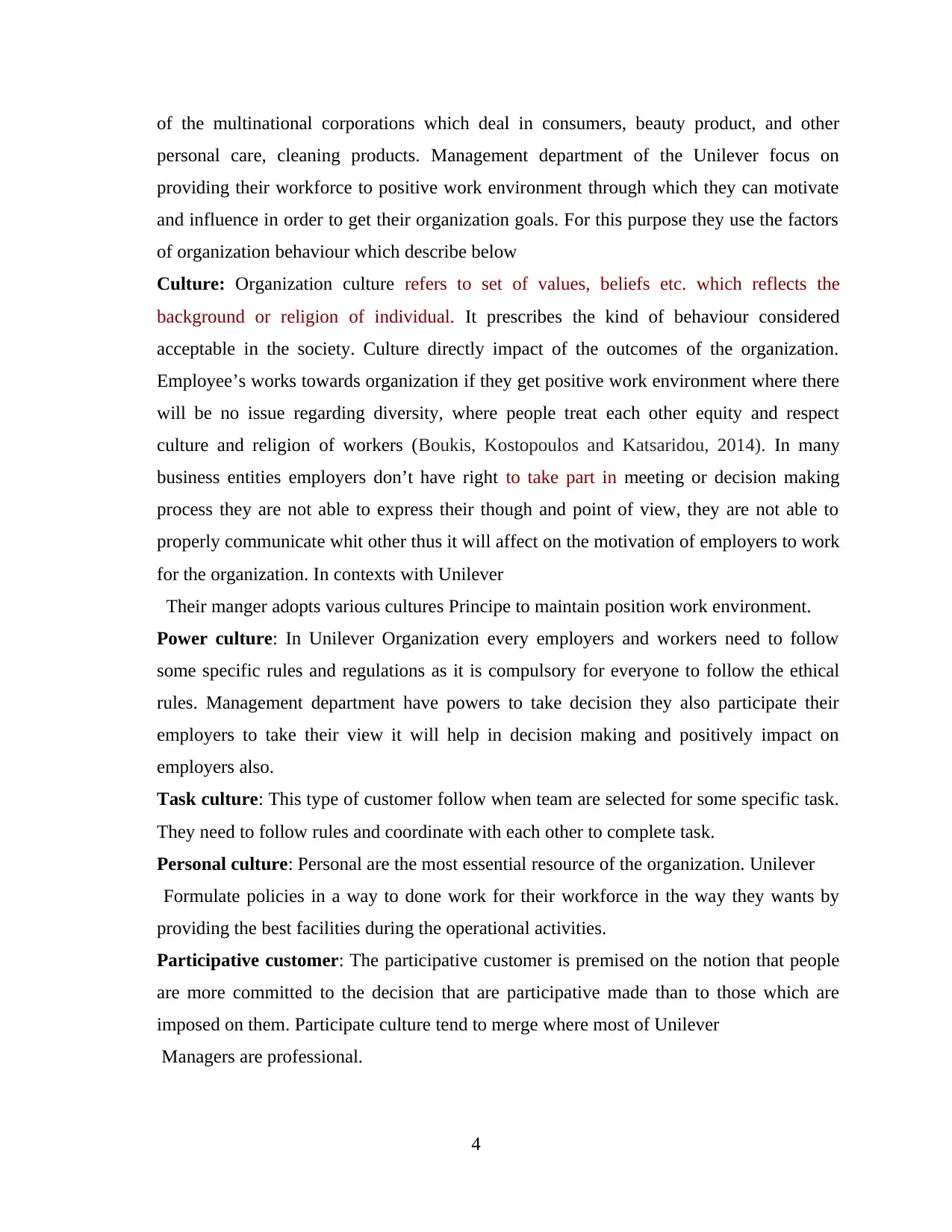
of the multinational corporations which deal in consumers, beauty product, and other
personal care, cleaning products. Management department of the Unilever focus on
providing their workforce to positive work environment through which they can motivate
and influence in order to get their organization goals. For this purpose they use the factors
of organization behaviour which describe below
Culture: Organization culture refers to set of values, beliefs etc. which reflects the
background or religion of individual. It prescribes the kind of behaviour considered
acceptable in the society. Culture directly impact of the outcomes of the organization.
Employee’s works towards organization if they get positive work environment where there
will be no issue regarding diversity, where people treat each other equity and respect
culture and religion of workers (Boukis, Kostopoulos and Katsaridou, 2014). In many
business entities employers don’t have right to take part in meeting or decision making
process they are not able to express their though and point of view, they are not able to
properly communicate whit other thus it will affect on the motivation of employers to work
for the organization. In contexts with Unilever
Their manger adopts various cultures Principe to maintain position work environment.
Power culture: In Unilever Organization every employers and workers need to follow
some specific rules and regulations as it is compulsory for everyone to follow the ethical
rules. Management department have powers to take decision they also participate their
employers to take their view it will help in decision making and positively impact on
employers also.
Task culture: This type of customer follow when team are selected for some specific task.
They need to follow rules and coordinate with each other to complete task.
Personal culture: Personal are the most essential resource of the organization. Unilever
Formulate policies in a way to done work for their workforce in the way they wants by
providing the best facilities during the operational activities.
Participative customer: The participative customer is premised on the notion that people
are more committed to the decision that are participative made than to those which are
imposed on them. Participate culture tend to merge where most of Unilever
Managers are professional.
4
personal care, cleaning products. Management department of the Unilever focus on
providing their workforce to positive work environment through which they can motivate
and influence in order to get their organization goals. For this purpose they use the factors
of organization behaviour which describe below
Culture: Organization culture refers to set of values, beliefs etc. which reflects the
background or religion of individual. It prescribes the kind of behaviour considered
acceptable in the society. Culture directly impact of the outcomes of the organization.
Employee’s works towards organization if they get positive work environment where there
will be no issue regarding diversity, where people treat each other equity and respect
culture and religion of workers (Boukis, Kostopoulos and Katsaridou, 2014). In many
business entities employers don’t have right to take part in meeting or decision making
process they are not able to express their though and point of view, they are not able to
properly communicate whit other thus it will affect on the motivation of employers to work
for the organization. In contexts with Unilever
Their manger adopts various cultures Principe to maintain position work environment.
Power culture: In Unilever Organization every employers and workers need to follow
some specific rules and regulations as it is compulsory for everyone to follow the ethical
rules. Management department have powers to take decision they also participate their
employers to take their view it will help in decision making and positively impact on
employers also.
Task culture: This type of customer follow when team are selected for some specific task.
They need to follow rules and coordinate with each other to complete task.
Personal culture: Personal are the most essential resource of the organization. Unilever
Formulate policies in a way to done work for their workforce in the way they wants by
providing the best facilities during the operational activities.
Participative customer: The participative customer is premised on the notion that people
are more committed to the decision that are participative made than to those which are
imposed on them. Participate culture tend to merge where most of Unilever
Managers are professional.
4
Paraphrase This Document
Need a fresh take? Get an instant paraphrase of this document with our AI Paraphraser
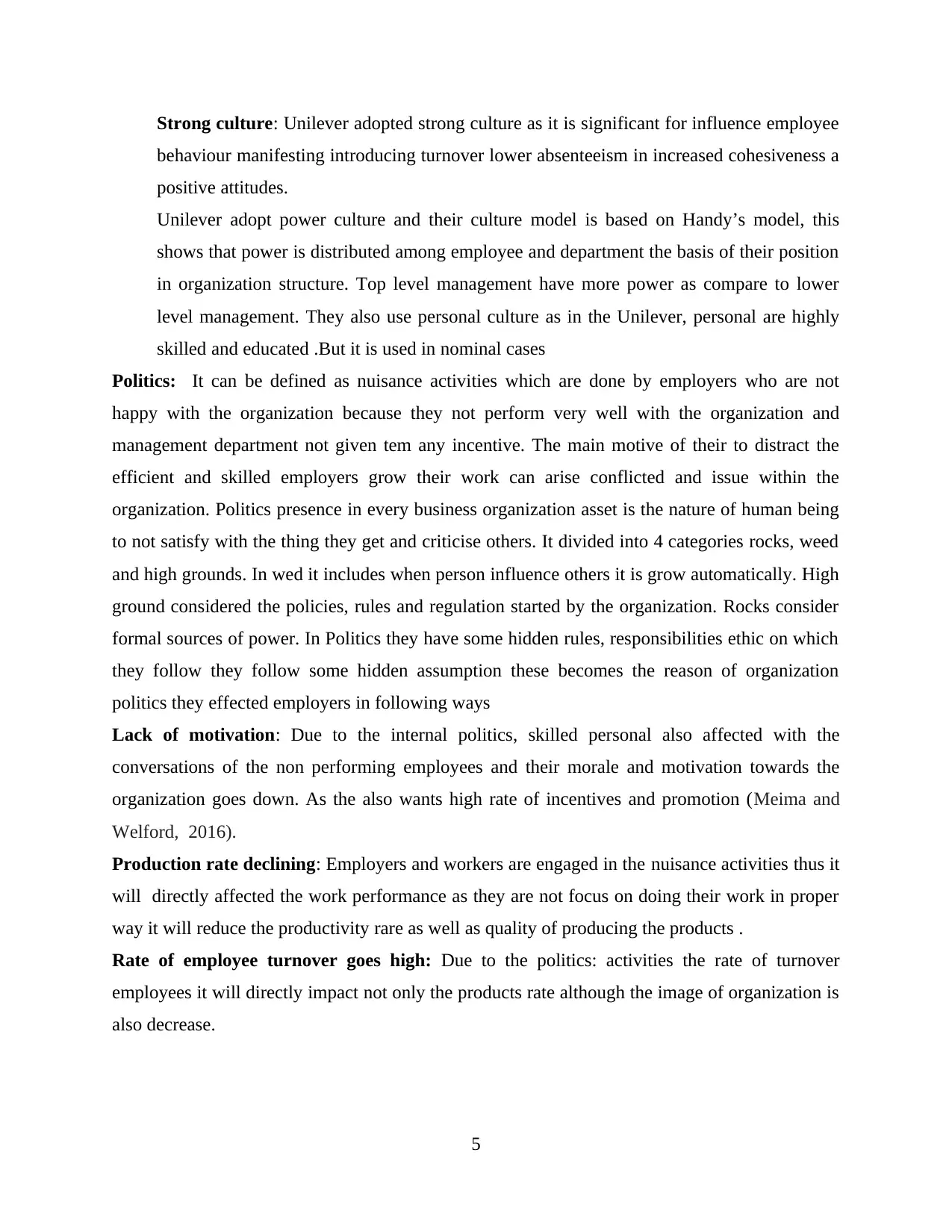
Strong culture: Unilever adopted strong culture as it is significant for influence employee
behaviour manifesting introducing turnover lower absenteeism in increased cohesiveness a
positive attitudes.
Unilever adopt power culture and their culture model is based on Handy’s model, this
shows that power is distributed among employee and department the basis of their position
in organization structure. Top level management have more power as compare to lower
level management. They also use personal culture as in the Unilever, personal are highly
skilled and educated .But it is used in nominal cases
Politics: It can be defined as nuisance activities which are done by employers who are not
happy with the organization because they not perform very well with the organization and
management department not given tem any incentive. The main motive of their to distract the
efficient and skilled employers grow their work can arise conflicted and issue within the
organization. Politics presence in every business organization asset is the nature of human being
to not satisfy with the thing they get and criticise others. It divided into 4 categories rocks, weed
and high grounds. In wed it includes when person influence others it is grow automatically. High
ground considered the policies, rules and regulation started by the organization. Rocks consider
formal sources of power. In Politics they have some hidden rules, responsibilities ethic on which
they follow they follow some hidden assumption these becomes the reason of organization
politics they effected employers in following ways
Lack of motivation: Due to the internal politics, skilled personal also affected with the
conversations of the non performing employees and their morale and motivation towards the
organization goes down. As the also wants high rate of incentives and promotion (Meima and
Welford, 2016).
Production rate declining: Employers and workers are engaged in the nuisance activities thus it
will directly affected the work performance as they are not focus on doing their work in proper
way it will reduce the productivity rare as well as quality of producing the products .
Rate of employee turnover goes high: Due to the politics: activities the rate of turnover
employees it will directly impact not only the products rate although the image of organization is
also decrease.
5
behaviour manifesting introducing turnover lower absenteeism in increased cohesiveness a
positive attitudes.
Unilever adopt power culture and their culture model is based on Handy’s model, this
shows that power is distributed among employee and department the basis of their position
in organization structure. Top level management have more power as compare to lower
level management. They also use personal culture as in the Unilever, personal are highly
skilled and educated .But it is used in nominal cases
Politics: It can be defined as nuisance activities which are done by employers who are not
happy with the organization because they not perform very well with the organization and
management department not given tem any incentive. The main motive of their to distract the
efficient and skilled employers grow their work can arise conflicted and issue within the
organization. Politics presence in every business organization asset is the nature of human being
to not satisfy with the thing they get and criticise others. It divided into 4 categories rocks, weed
and high grounds. In wed it includes when person influence others it is grow automatically. High
ground considered the policies, rules and regulation started by the organization. Rocks consider
formal sources of power. In Politics they have some hidden rules, responsibilities ethic on which
they follow they follow some hidden assumption these becomes the reason of organization
politics they effected employers in following ways
Lack of motivation: Due to the internal politics, skilled personal also affected with the
conversations of the non performing employees and their morale and motivation towards the
organization goes down. As the also wants high rate of incentives and promotion (Meima and
Welford, 2016).
Production rate declining: Employers and workers are engaged in the nuisance activities thus it
will directly affected the work performance as they are not focus on doing their work in proper
way it will reduce the productivity rare as well as quality of producing the products .
Rate of employee turnover goes high: Due to the politics: activities the rate of turnover
employees it will directly impact not only the products rate although the image of organization is
also decrease.
5
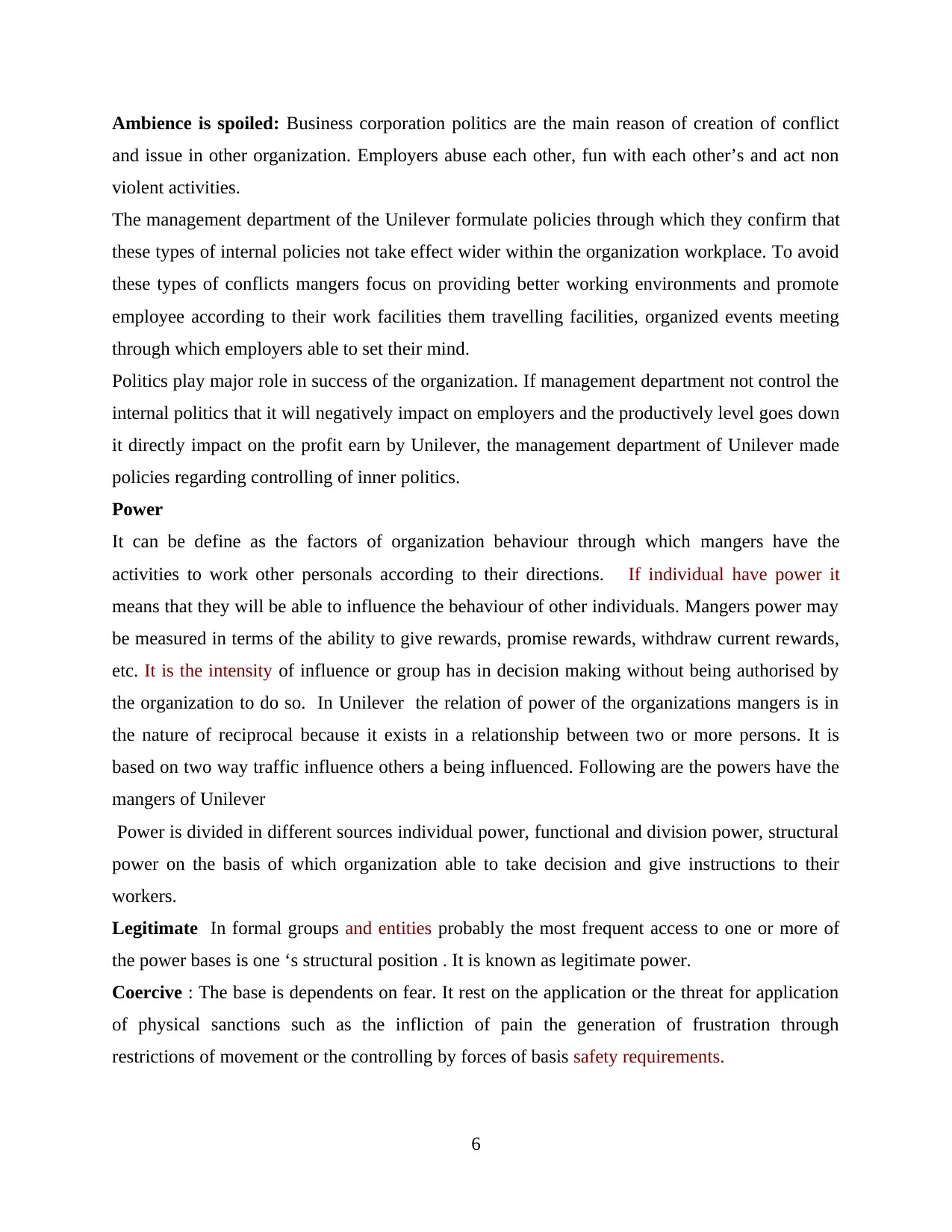
Ambience is spoiled: Business corporation politics are the main reason of creation of conflict
and issue in other organization. Employers abuse each other, fun with each other’s and act non
violent activities.
The management department of the Unilever formulate policies through which they confirm that
these types of internal policies not take effect wider within the organization workplace. To avoid
these types of conflicts mangers focus on providing better working environments and promote
employee according to their work facilities them travelling facilities, organized events meeting
through which employers able to set their mind.
Politics play major role in success of the organization. If management department not control the
internal politics that it will negatively impact on employers and the productively level goes down
it directly impact on the profit earn by Unilever, the management department of Unilever made
policies regarding controlling of inner politics.
Power
It can be define as the factors of organization behaviour through which mangers have the
activities to work other personals according to their directions. If individual have power it
means that they will be able to influence the behaviour of other individuals. Mangers power may
be measured in terms of the ability to give rewards, promise rewards, withdraw current rewards,
etc. It is the intensity of influence or group has in decision making without being authorised by
the organization to do so. In Unilever the relation of power of the organizations mangers is in
the nature of reciprocal because it exists in a relationship between two or more persons. It is
based on two way traffic influence others a being influenced. Following are the powers have the
mangers of Unilever
Power is divided in different sources individual power, functional and division power, structural
power on the basis of which organization able to take decision and give instructions to their
workers.
Legitimate In formal groups and entities probably the most frequent access to one or more of
the power bases is one ‘s structural position . It is known as legitimate power.
Coercive : The base is dependents on fear. It rest on the application or the threat for application
of physical sanctions such as the infliction of pain the generation of frustration through
restrictions of movement or the controlling by forces of basis safety requirements.
6
and issue in other organization. Employers abuse each other, fun with each other’s and act non
violent activities.
The management department of the Unilever formulate policies through which they confirm that
these types of internal policies not take effect wider within the organization workplace. To avoid
these types of conflicts mangers focus on providing better working environments and promote
employee according to their work facilities them travelling facilities, organized events meeting
through which employers able to set their mind.
Politics play major role in success of the organization. If management department not control the
internal politics that it will negatively impact on employers and the productively level goes down
it directly impact on the profit earn by Unilever, the management department of Unilever made
policies regarding controlling of inner politics.
Power
It can be define as the factors of organization behaviour through which mangers have the
activities to work other personals according to their directions. If individual have power it
means that they will be able to influence the behaviour of other individuals. Mangers power may
be measured in terms of the ability to give rewards, promise rewards, withdraw current rewards,
etc. It is the intensity of influence or group has in decision making without being authorised by
the organization to do so. In Unilever the relation of power of the organizations mangers is in
the nature of reciprocal because it exists in a relationship between two or more persons. It is
based on two way traffic influence others a being influenced. Following are the powers have the
mangers of Unilever
Power is divided in different sources individual power, functional and division power, structural
power on the basis of which organization able to take decision and give instructions to their
workers.
Legitimate In formal groups and entities probably the most frequent access to one or more of
the power bases is one ‘s structural position . It is known as legitimate power.
Coercive : The base is dependents on fear. It rest on the application or the threat for application
of physical sanctions such as the infliction of pain the generation of frustration through
restrictions of movement or the controlling by forces of basis safety requirements.
6
⊘ This is a preview!⊘
Do you want full access?
Subscribe today to unlock all pages.

Trusted by 1+ million students worldwide
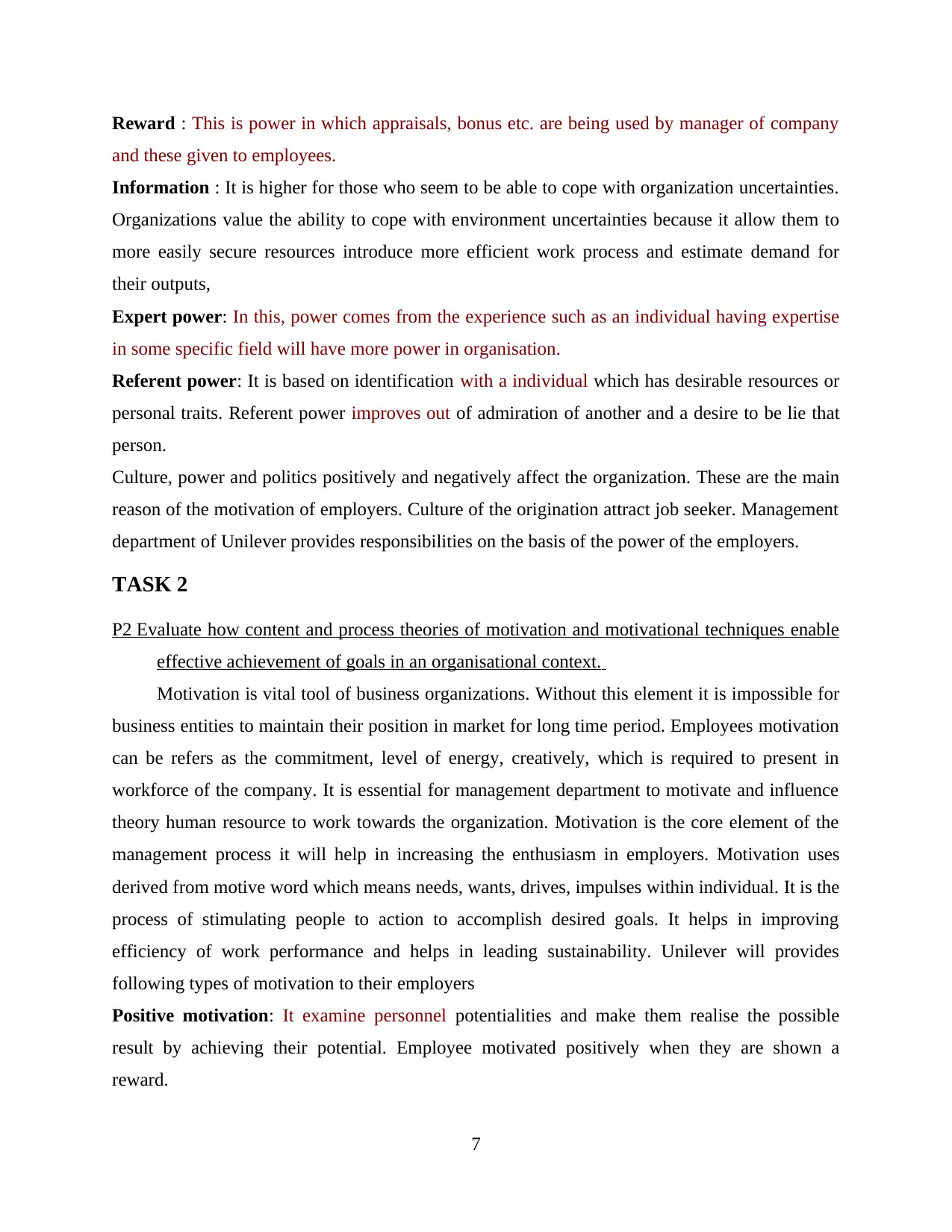
Reward : This is power in which appraisals, bonus etc. are being used by manager of company
and these given to employees.
Information : It is higher for those who seem to be able to cope with organization uncertainties.
Organizations value the ability to cope with environment uncertainties because it allow them to
more easily secure resources introduce more efficient work process and estimate demand for
their outputs,
Expert power: In this, power comes from the experience such as an individual having expertise
in some specific field will have more power in organisation.
Referent power: It is based on identification with a individual which has desirable resources or
personal traits. Referent power improves out of admiration of another and a desire to be lie that
person.
Culture, power and politics positively and negatively affect the organization. These are the main
reason of the motivation of employers. Culture of the origination attract job seeker. Management
department of Unilever provides responsibilities on the basis of the power of the employers.
TASK 2
P2 Evaluate how content and process theories of motivation and motivational techniques enable
effective achievement of goals in an organisational context.
Motivation is vital tool of business organizations. Without this element it is impossible for
business entities to maintain their position in market for long time period. Employees motivation
can be refers as the commitment, level of energy, creatively, which is required to present in
workforce of the company. It is essential for management department to motivate and influence
theory human resource to work towards the organization. Motivation is the core element of the
management process it will help in increasing the enthusiasm in employers. Motivation uses
derived from motive word which means needs, wants, drives, impulses within individual. It is the
process of stimulating people to action to accomplish desired goals. It helps in improving
efficiency of work performance and helps in leading sustainability. Unilever will provides
following types of motivation to their employers
Positive motivation: It examine personnel potentialities and make them realise the possible
result by achieving their potential. Employee motivated positively when they are shown a
reward.
7
and these given to employees.
Information : It is higher for those who seem to be able to cope with organization uncertainties.
Organizations value the ability to cope with environment uncertainties because it allow them to
more easily secure resources introduce more efficient work process and estimate demand for
their outputs,
Expert power: In this, power comes from the experience such as an individual having expertise
in some specific field will have more power in organisation.
Referent power: It is based on identification with a individual which has desirable resources or
personal traits. Referent power improves out of admiration of another and a desire to be lie that
person.
Culture, power and politics positively and negatively affect the organization. These are the main
reason of the motivation of employers. Culture of the origination attract job seeker. Management
department of Unilever provides responsibilities on the basis of the power of the employers.
TASK 2
P2 Evaluate how content and process theories of motivation and motivational techniques enable
effective achievement of goals in an organisational context.
Motivation is vital tool of business organizations. Without this element it is impossible for
business entities to maintain their position in market for long time period. Employees motivation
can be refers as the commitment, level of energy, creatively, which is required to present in
workforce of the company. It is essential for management department to motivate and influence
theory human resource to work towards the organization. Motivation is the core element of the
management process it will help in increasing the enthusiasm in employers. Motivation uses
derived from motive word which means needs, wants, drives, impulses within individual. It is the
process of stimulating people to action to accomplish desired goals. It helps in improving
efficiency of work performance and helps in leading sustainability. Unilever will provides
following types of motivation to their employers
Positive motivation: It examine personnel potentialities and make them realise the possible
result by achieving their potential. Employee motivated positively when they are shown a
reward.
7
Paraphrase This Document
Need a fresh take? Get an instant paraphrase of this document with our AI Paraphraser
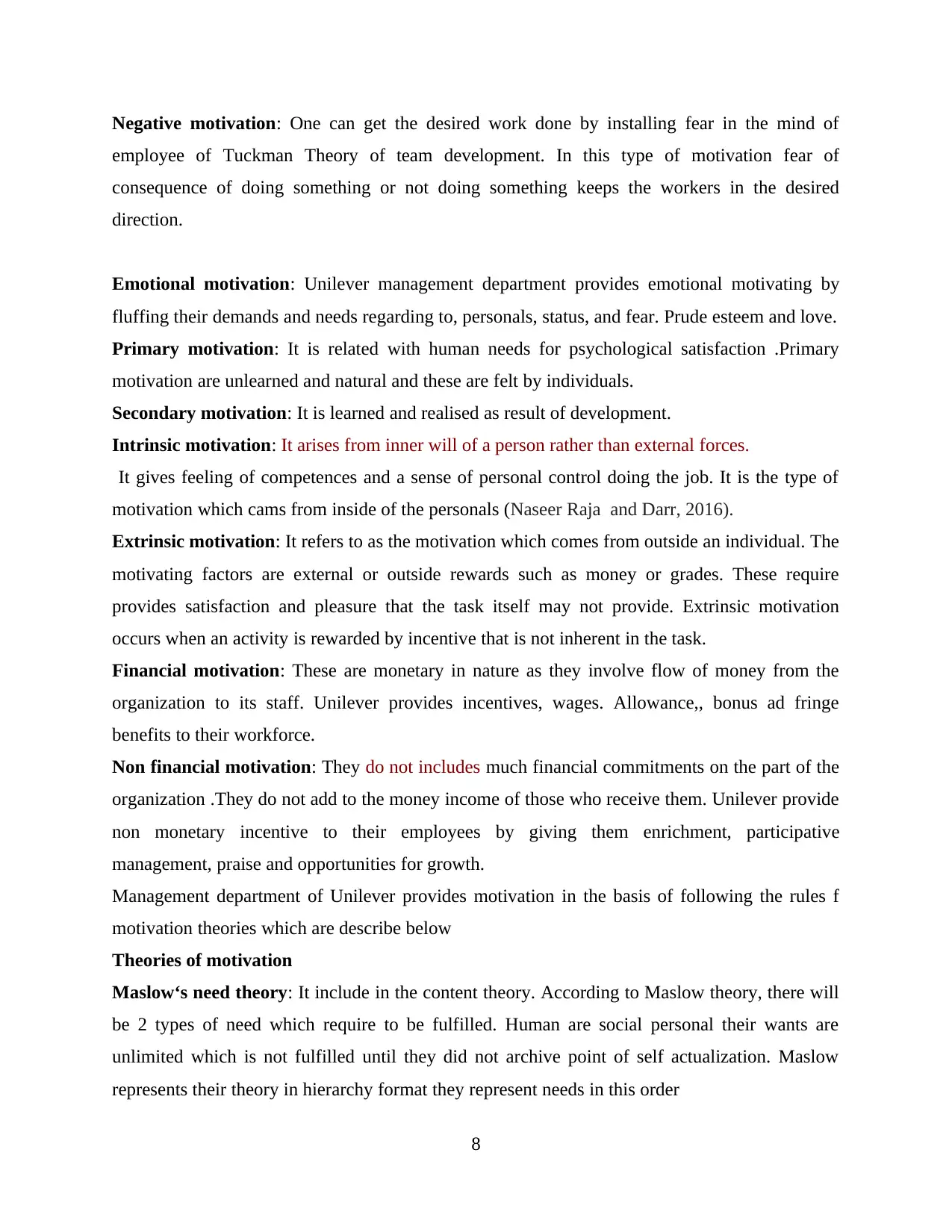
Negative motivation: One can get the desired work done by installing fear in the mind of
employee of Tuckman Theory of team development. In this type of motivation fear of
consequence of doing something or not doing something keeps the workers in the desired
direction.
Emotional motivation: Unilever management department provides emotional motivating by
fluffing their demands and needs regarding to, personals, status, and fear. Prude esteem and love.
Primary motivation: It is related with human needs for psychological satisfaction .Primary
motivation are unlearned and natural and these are felt by individuals.
Secondary motivation: It is learned and realised as result of development.
Intrinsic motivation: It arises from inner will of a person rather than external forces.
It gives feeling of competences and a sense of personal control doing the job. It is the type of
motivation which cams from inside of the personals (Naseer Raja and Darr, 2016).
Extrinsic motivation: It refers to as the motivation which comes from outside an individual. The
motivating factors are external or outside rewards such as money or grades. These require
provides satisfaction and pleasure that the task itself may not provide. Extrinsic motivation
occurs when an activity is rewarded by incentive that is not inherent in the task.
Financial motivation: These are monetary in nature as they involve flow of money from the
organization to its staff. Unilever provides incentives, wages. Allowance,, bonus ad fringe
benefits to their workforce.
Non financial motivation: They do not includes much financial commitments on the part of the
organization .They do not add to the money income of those who receive them. Unilever provide
non monetary incentive to their employees by giving them enrichment, participative
management, praise and opportunities for growth.
Management department of Unilever provides motivation in the basis of following the rules f
motivation theories which are describe below
Theories of motivation
Maslow‘s need theory: It include in the content theory. According to Maslow theory, there will
be 2 types of need which require to be fulfilled. Human are social personal their wants are
unlimited which is not fulfilled until they did not archive point of self actualization. Maslow
represents their theory in hierarchy format they represent needs in this order
8
employee of Tuckman Theory of team development. In this type of motivation fear of
consequence of doing something or not doing something keeps the workers in the desired
direction.
Emotional motivation: Unilever management department provides emotional motivating by
fluffing their demands and needs regarding to, personals, status, and fear. Prude esteem and love.
Primary motivation: It is related with human needs for psychological satisfaction .Primary
motivation are unlearned and natural and these are felt by individuals.
Secondary motivation: It is learned and realised as result of development.
Intrinsic motivation: It arises from inner will of a person rather than external forces.
It gives feeling of competences and a sense of personal control doing the job. It is the type of
motivation which cams from inside of the personals (Naseer Raja and Darr, 2016).
Extrinsic motivation: It refers to as the motivation which comes from outside an individual. The
motivating factors are external or outside rewards such as money or grades. These require
provides satisfaction and pleasure that the task itself may not provide. Extrinsic motivation
occurs when an activity is rewarded by incentive that is not inherent in the task.
Financial motivation: These are monetary in nature as they involve flow of money from the
organization to its staff. Unilever provides incentives, wages. Allowance,, bonus ad fringe
benefits to their workforce.
Non financial motivation: They do not includes much financial commitments on the part of the
organization .They do not add to the money income of those who receive them. Unilever provide
non monetary incentive to their employees by giving them enrichment, participative
management, praise and opportunities for growth.
Management department of Unilever provides motivation in the basis of following the rules f
motivation theories which are describe below
Theories of motivation
Maslow‘s need theory: It include in the content theory. According to Maslow theory, there will
be 2 types of need which require to be fulfilled. Human are social personal their wants are
unlimited which is not fulfilled until they did not archive point of self actualization. Maslow
represents their theory in hierarchy format they represent needs in this order
8
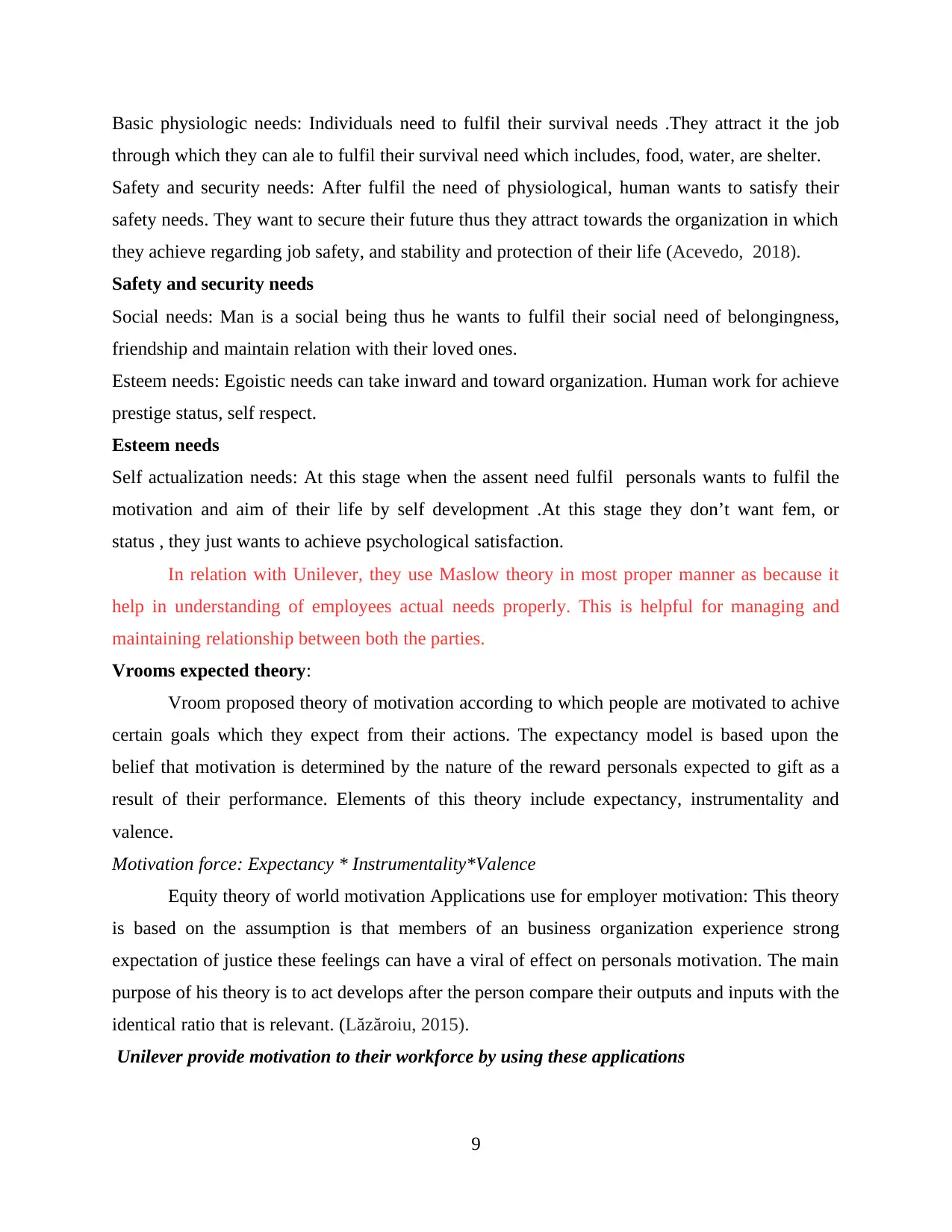
Basic physiologic needs: Individuals need to fulfil their survival needs .They attract it the job
through which they can ale to fulfil their survival need which includes, food, water, are shelter.
Safety and security needs: After fulfil the need of physiological, human wants to satisfy their
safety needs. They want to secure their future thus they attract towards the organization in which
they achieve regarding job safety, and stability and protection of their life (Acevedo, 2018).
Safety and security needs
Social needs: Man is a social being thus he wants to fulfil their social need of belongingness,
friendship and maintain relation with their loved ones.
Esteem needs: Egoistic needs can take inward and toward organization. Human work for achieve
prestige status, self respect.
Esteem needs
Self actualization needs: At this stage when the assent need fulfil personals wants to fulfil the
motivation and aim of their life by self development .At this stage they don’t want fem, or
status , they just wants to achieve psychological satisfaction.
In relation with Unilever, they use Maslow theory in most proper manner as because it
help in understanding of employees actual needs properly. This is helpful for managing and
maintaining relationship between both the parties.
Vrooms expected theory:
Vroom proposed theory of motivation according to which people are motivated to achive
certain goals which they expect from their actions. The expectancy model is based upon the
belief that motivation is determined by the nature of the reward personals expected to gift as a
result of their performance. Elements of this theory include expectancy, instrumentality and
valence.
Motivation force: Expectancy * Instrumentality*Valence
Equity theory of world motivation Applications use for employer motivation: This theory
is based on the assumption is that members of an business organization experience strong
expectation of justice these feelings can have a viral of effect on personals motivation. The main
purpose of his theory is to act develops after the person compare their outputs and inputs with the
identical ratio that is relevant. (Lăzăroiu, 2015).
Unilever provide motivation to their workforce by using these applications
9
through which they can ale to fulfil their survival need which includes, food, water, are shelter.
Safety and security needs: After fulfil the need of physiological, human wants to satisfy their
safety needs. They want to secure their future thus they attract towards the organization in which
they achieve regarding job safety, and stability and protection of their life (Acevedo, 2018).
Safety and security needs
Social needs: Man is a social being thus he wants to fulfil their social need of belongingness,
friendship and maintain relation with their loved ones.
Esteem needs: Egoistic needs can take inward and toward organization. Human work for achieve
prestige status, self respect.
Esteem needs
Self actualization needs: At this stage when the assent need fulfil personals wants to fulfil the
motivation and aim of their life by self development .At this stage they don’t want fem, or
status , they just wants to achieve psychological satisfaction.
In relation with Unilever, they use Maslow theory in most proper manner as because it
help in understanding of employees actual needs properly. This is helpful for managing and
maintaining relationship between both the parties.
Vrooms expected theory:
Vroom proposed theory of motivation according to which people are motivated to achive
certain goals which they expect from their actions. The expectancy model is based upon the
belief that motivation is determined by the nature of the reward personals expected to gift as a
result of their performance. Elements of this theory include expectancy, instrumentality and
valence.
Motivation force: Expectancy * Instrumentality*Valence
Equity theory of world motivation Applications use for employer motivation: This theory
is based on the assumption is that members of an business organization experience strong
expectation of justice these feelings can have a viral of effect on personals motivation. The main
purpose of his theory is to act develops after the person compare their outputs and inputs with the
identical ratio that is relevant. (Lăzăroiu, 2015).
Unilever provide motivation to their workforce by using these applications
9
⊘ This is a preview!⊘
Do you want full access?
Subscribe today to unlock all pages.

Trusted by 1+ million students worldwide
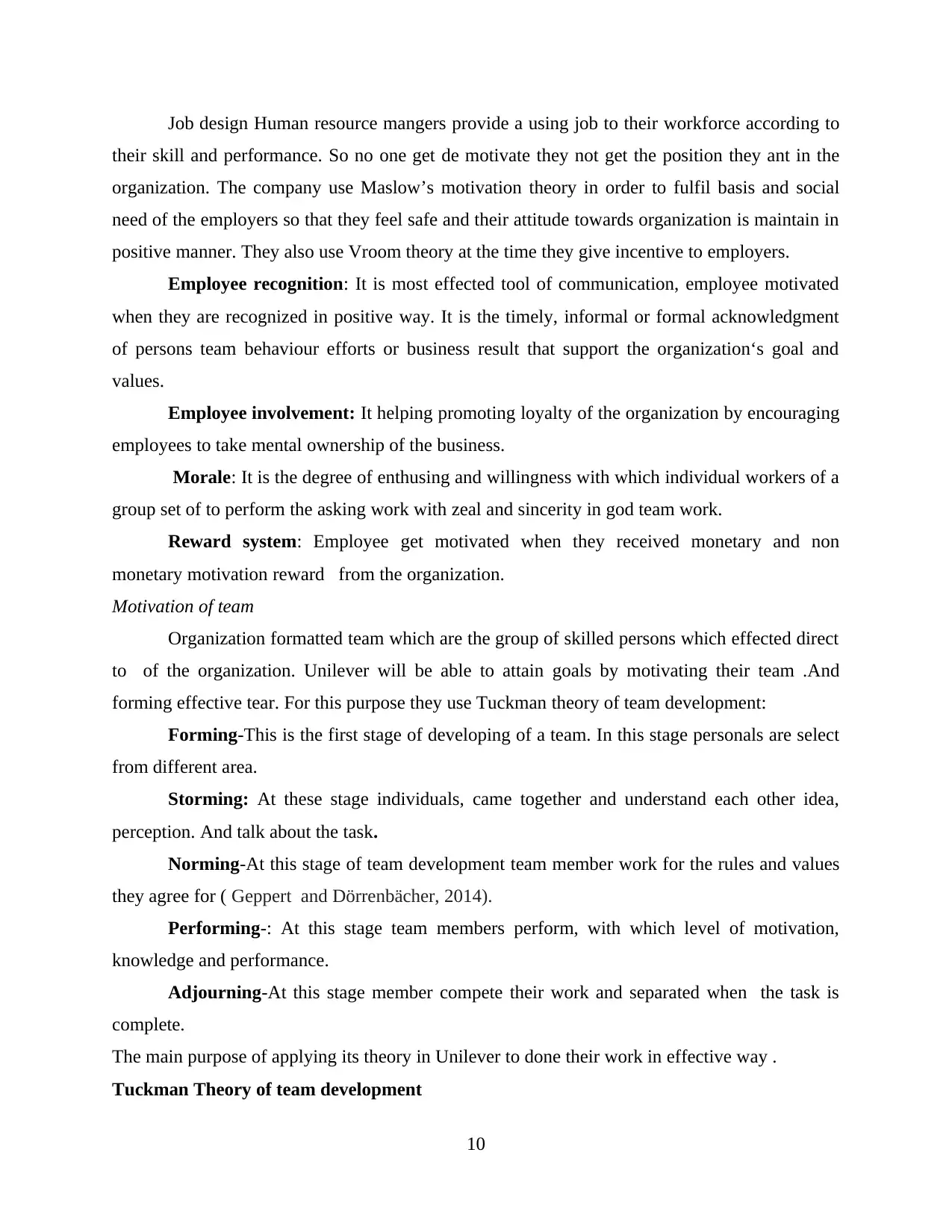
Job design Human resource mangers provide a using job to their workforce according to
their skill and performance. So no one get de motivate they not get the position they ant in the
organization. The company use Maslow’s motivation theory in order to fulfil basis and social
need of the employers so that they feel safe and their attitude towards organization is maintain in
positive manner. They also use Vroom theory at the time they give incentive to employers.
Employee recognition: It is most effected tool of communication, employee motivated
when they are recognized in positive way. It is the timely, informal or formal acknowledgment
of persons team behaviour efforts or business result that support the organization‘s goal and
values.
Employee involvement: It helping promoting loyalty of the organization by encouraging
employees to take mental ownership of the business.
Morale: It is the degree of enthusing and willingness with which individual workers of a
group set of to perform the asking work with zeal and sincerity in god team work.
Reward system: Employee get motivated when they received monetary and non
monetary motivation reward from the organization.
Motivation of team
Organization formatted team which are the group of skilled persons which effected direct
to of the organization. Unilever will be able to attain goals by motivating their team .And
forming effective tear. For this purpose they use Tuckman theory of team development:
Forming-This is the first stage of developing of a team. In this stage personals are select
from different area.
Storming: At these stage individuals, came together and understand each other idea,
perception. And talk about the task.
Norming-At this stage of team development team member work for the rules and values
they agree for ( Geppert and Dörrenbächer, 2014).
Performing-: At this stage team members perform, with which level of motivation,
knowledge and performance.
Adjourning-At this stage member compete their work and separated when the task is
complete.
The main purpose of applying its theory in Unilever to done their work in effective way .
Tuckman Theory of team development
10
their skill and performance. So no one get de motivate they not get the position they ant in the
organization. The company use Maslow’s motivation theory in order to fulfil basis and social
need of the employers so that they feel safe and their attitude towards organization is maintain in
positive manner. They also use Vroom theory at the time they give incentive to employers.
Employee recognition: It is most effected tool of communication, employee motivated
when they are recognized in positive way. It is the timely, informal or formal acknowledgment
of persons team behaviour efforts or business result that support the organization‘s goal and
values.
Employee involvement: It helping promoting loyalty of the organization by encouraging
employees to take mental ownership of the business.
Morale: It is the degree of enthusing and willingness with which individual workers of a
group set of to perform the asking work with zeal and sincerity in god team work.
Reward system: Employee get motivated when they received monetary and non
monetary motivation reward from the organization.
Motivation of team
Organization formatted team which are the group of skilled persons which effected direct
to of the organization. Unilever will be able to attain goals by motivating their team .And
forming effective tear. For this purpose they use Tuckman theory of team development:
Forming-This is the first stage of developing of a team. In this stage personals are select
from different area.
Storming: At these stage individuals, came together and understand each other idea,
perception. And talk about the task.
Norming-At this stage of team development team member work for the rules and values
they agree for ( Geppert and Dörrenbächer, 2014).
Performing-: At this stage team members perform, with which level of motivation,
knowledge and performance.
Adjourning-At this stage member compete their work and separated when the task is
complete.
The main purpose of applying its theory in Unilever to done their work in effective way .
Tuckman Theory of team development
10
Paraphrase This Document
Need a fresh take? Get an instant paraphrase of this document with our AI Paraphraser
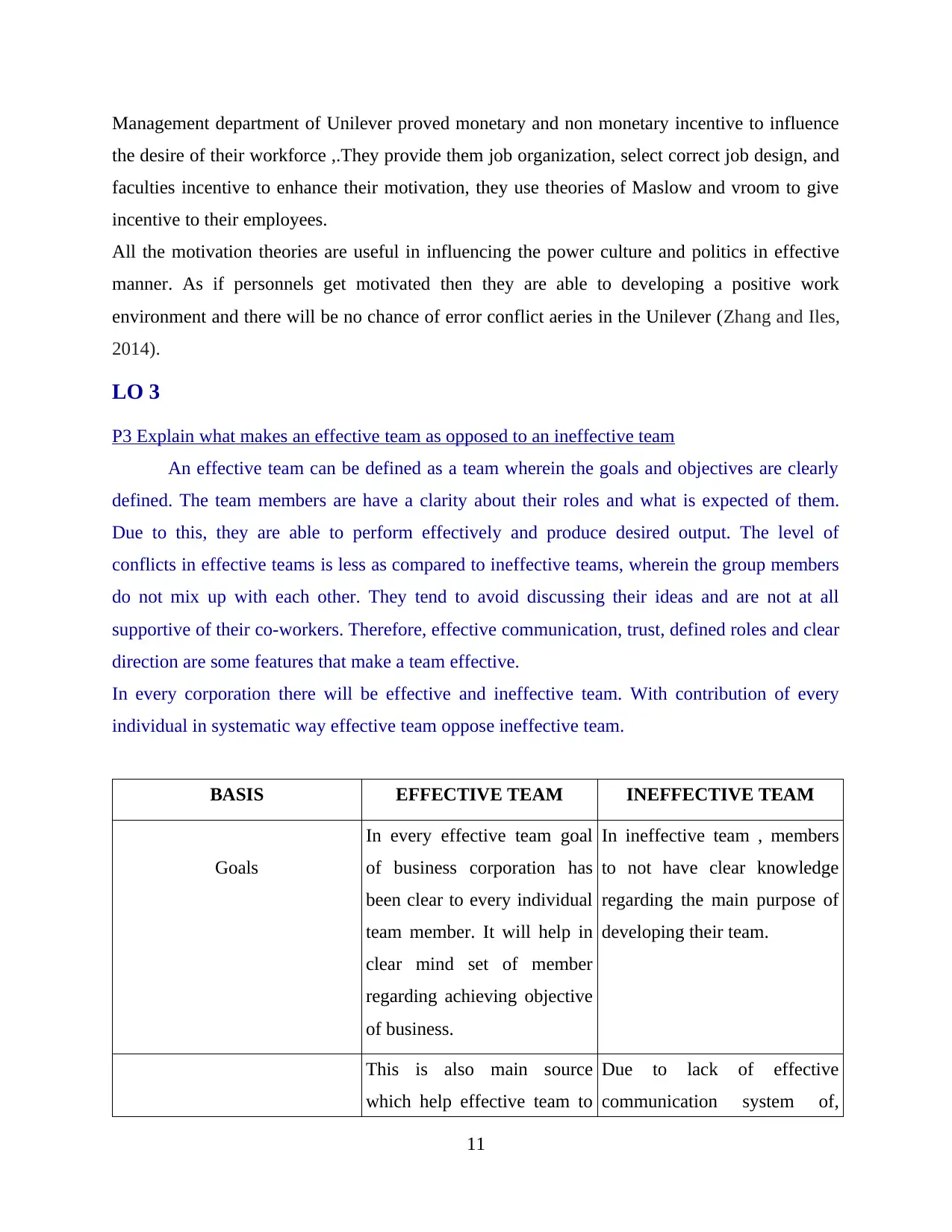
Management department of Unilever proved monetary and non monetary incentive to influence
the desire of their workforce ,.They provide them job organization, select correct job design, and
faculties incentive to enhance their motivation, they use theories of Maslow and vroom to give
incentive to their employees.
All the motivation theories are useful in influencing the power culture and politics in effective
manner. As if personnels get motivated then they are able to developing a positive work
environment and there will be no chance of error conflict aeries in the Unilever (Zhang and Iles,
2014).
LO 3
P3 Explain what makes an effective team as opposed to an ineffective team
An effective team can be defined as a team wherein the goals and objectives are clearly
defined. The team members are have a clarity about their roles and what is expected of them.
Due to this, they are able to perform effectively and produce desired output. The level of
conflicts in effective teams is less as compared to ineffective teams, wherein the group members
do not mix up with each other. They tend to avoid discussing their ideas and are not at all
supportive of their co-workers. Therefore, effective communication, trust, defined roles and clear
direction are some features that make a team effective.
In every corporation there will be effective and ineffective team. With contribution of every
individual in systematic way effective team oppose ineffective team.
BASIS EFFECTIVE TEAM INEFFECTIVE TEAM
Goals
In every effective team goal
of business corporation has
been clear to every individual
team member. It will help in
clear mind set of member
regarding achieving objective
of business.
In ineffective team , members
to not have clear knowledge
regarding the main purpose of
developing their team.
This is also main source
which help effective team to
Due to lack of effective
communication system of,
11
the desire of their workforce ,.They provide them job organization, select correct job design, and
faculties incentive to enhance their motivation, they use theories of Maslow and vroom to give
incentive to their employees.
All the motivation theories are useful in influencing the power culture and politics in effective
manner. As if personnels get motivated then they are able to developing a positive work
environment and there will be no chance of error conflict aeries in the Unilever (Zhang and Iles,
2014).
LO 3
P3 Explain what makes an effective team as opposed to an ineffective team
An effective team can be defined as a team wherein the goals and objectives are clearly
defined. The team members are have a clarity about their roles and what is expected of them.
Due to this, they are able to perform effectively and produce desired output. The level of
conflicts in effective teams is less as compared to ineffective teams, wherein the group members
do not mix up with each other. They tend to avoid discussing their ideas and are not at all
supportive of their co-workers. Therefore, effective communication, trust, defined roles and clear
direction are some features that make a team effective.
In every corporation there will be effective and ineffective team. With contribution of every
individual in systematic way effective team oppose ineffective team.
BASIS EFFECTIVE TEAM INEFFECTIVE TEAM
Goals
In every effective team goal
of business corporation has
been clear to every individual
team member. It will help in
clear mind set of member
regarding achieving objective
of business.
In ineffective team , members
to not have clear knowledge
regarding the main purpose of
developing their team.
This is also main source
which help effective team to
Due to lack of effective
communication system of,
11
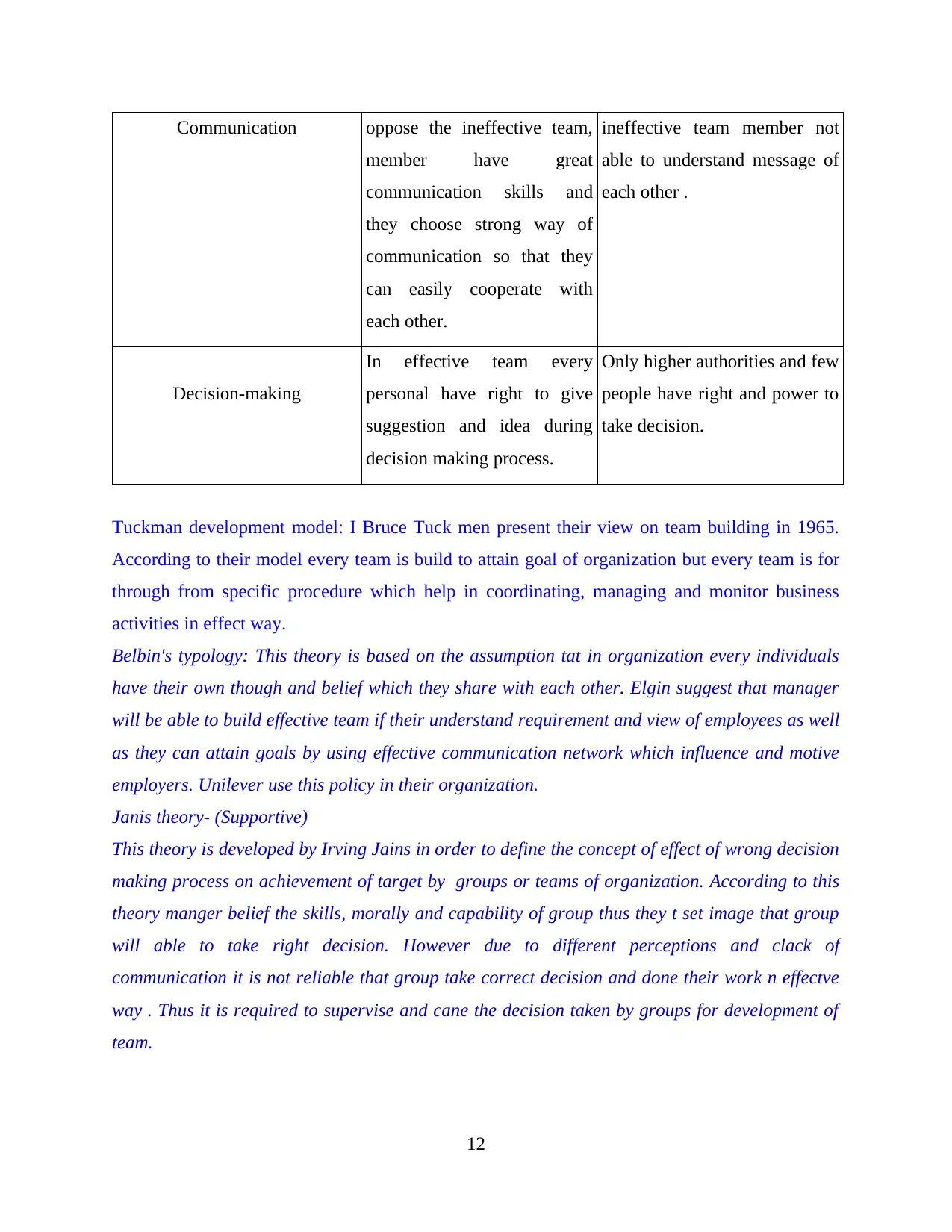
Communication oppose the ineffective team,
member have great
communication skills and
they choose strong way of
communication so that they
can easily cooperate with
each other.
ineffective team member not
able to understand message of
each other .
Decision-making
In effective team every
personal have right to give
suggestion and idea during
decision making process.
Only higher authorities and few
people have right and power to
take decision.
Tuckman development model: I Bruce Tuck men present their view on team building in 1965.
According to their model every team is build to attain goal of organization but every team is for
through from specific procedure which help in coordinating, managing and monitor business
activities in effect way.
Belbin's typology: This theory is based on the assumption tat in organization every individuals
have their own though and belief which they share with each other. Elgin suggest that manager
will be able to build effective team if their understand requirement and view of employees as well
as they can attain goals by using effective communication network which influence and motive
employers. Unilever use this policy in their organization.
Janis theory- (Supportive)
This theory is developed by Irving Jains in order to define the concept of effect of wrong decision
making process on achievement of target by groups or teams of organization. According to this
theory manger belief the skills, morally and capability of group thus they t set image that group
will able to take right decision. However due to different perceptions and clack of
communication it is not reliable that group take correct decision and done their work n effectve
way . Thus it is required to supervise and cane the decision taken by groups for development of
team.
12
member have great
communication skills and
they choose strong way of
communication so that they
can easily cooperate with
each other.
ineffective team member not
able to understand message of
each other .
Decision-making
In effective team every
personal have right to give
suggestion and idea during
decision making process.
Only higher authorities and few
people have right and power to
take decision.
Tuckman development model: I Bruce Tuck men present their view on team building in 1965.
According to their model every team is build to attain goal of organization but every team is for
through from specific procedure which help in coordinating, managing and monitor business
activities in effect way.
Belbin's typology: This theory is based on the assumption tat in organization every individuals
have their own though and belief which they share with each other. Elgin suggest that manager
will be able to build effective team if their understand requirement and view of employees as well
as they can attain goals by using effective communication network which influence and motive
employers. Unilever use this policy in their organization.
Janis theory- (Supportive)
This theory is developed by Irving Jains in order to define the concept of effect of wrong decision
making process on achievement of target by groups or teams of organization. According to this
theory manger belief the skills, morally and capability of group thus they t set image that group
will able to take right decision. However due to different perceptions and clack of
communication it is not reliable that group take correct decision and done their work n effectve
way . Thus it is required to supervise and cane the decision taken by groups for development of
team.
12
⊘ This is a preview!⊘
Do you want full access?
Subscribe today to unlock all pages.

Trusted by 1+ million students worldwide
1 out of 15
Related Documents
Your All-in-One AI-Powered Toolkit for Academic Success.
+13062052269
info@desklib.com
Available 24*7 on WhatsApp / Email
![[object Object]](/_next/static/media/star-bottom.7253800d.svg)
Unlock your academic potential
Copyright © 2020–2026 A2Z Services. All Rights Reserved. Developed and managed by ZUCOL.





